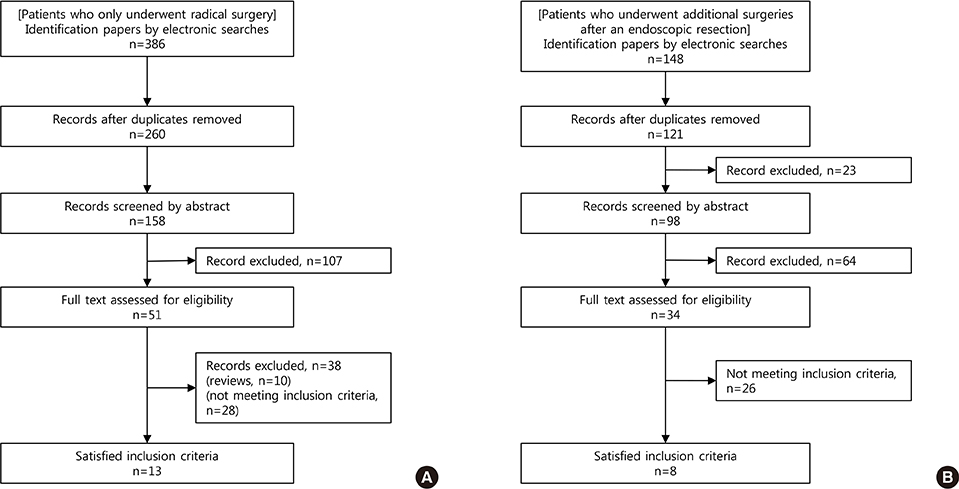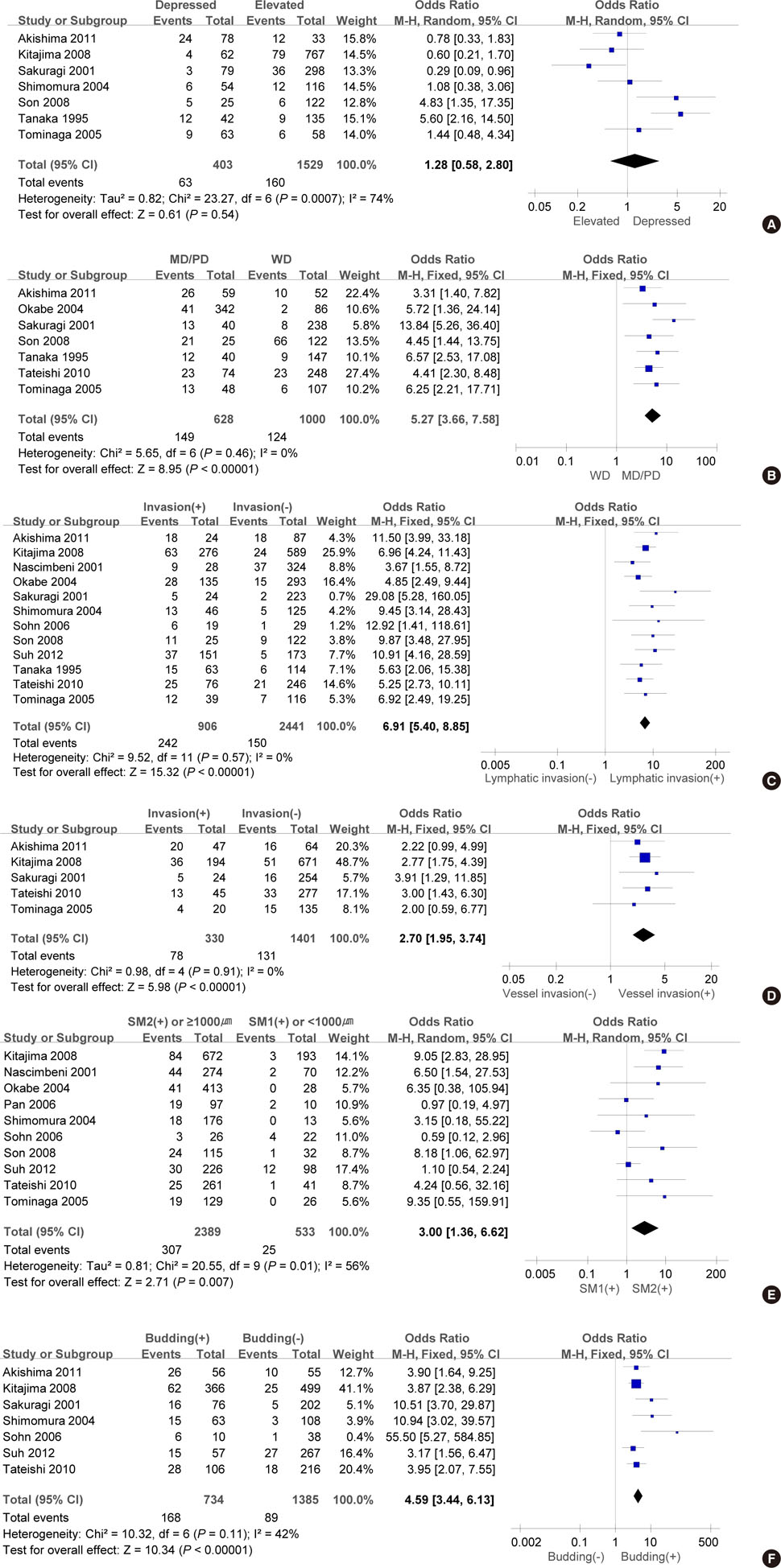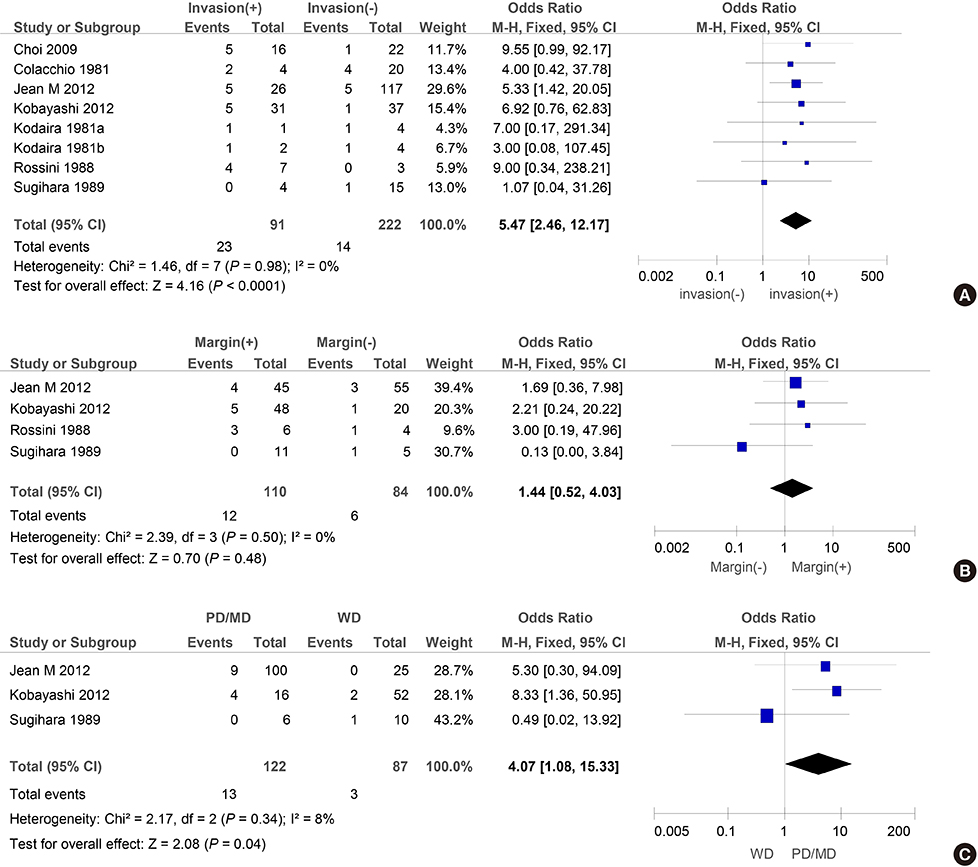Meta-analysis of Predictive Clinicopathologic Factors for Lymph Node Metastasis in Patients with Early Colorectal Carcinoma
- Affiliations
-
- 1Department of Internal Medicine, Ewha Medical Research Institute, Ewha Womans University School of Medicine, Seoul, Korea. jassa@ewha.ac.kr
- 2Department of Internal Medicine, Korea University College of Medicine, Seoul, Korea.
- 3Department of Internal Medicine, Asan Medical Center, University of Ulsan College of Medicine, Seoul, Korea.
- 4Department of Internal Medicine, Konyang University College of Medicine, Daejeon, Korea.
- 5Department of Internal Medicine, Yeungnam University College of Medicine, Daegu, Korea.
- 6Department of Internal Medicine, Samsung Medical Center, Sungkyunkwan University School of Medicine, Seoul, Korea.
- 7Clinical Trial Center, Ewha Womans University Medical Center, Seoul, Korea.
- KMID: 2164447
- DOI: http://doi.org/10.3346/jkms.2015.30.4.398
Abstract
- The objective of this study was to conduct a meta-analysis to determine risk factors that may facilitate patient selection for radical resections or additional resections after a polypectomy. Eligible articles were identified by searches of PUBMED, Cochrane Library and Korean Medical Database using the terms (early colorectal carcinoma [ECC], lymph node metastasis [LNM], colectomy, endoscopic resection). Thirteen cohort studies of 7,066 ECC patients who only underwent radical surgery have been analysed. There was a significant risk of LNM when they had submucosal invasion (> or = SM2 or > or = 1,000 microm) (odds Ratio [OR], 3.00; 95% confidence interval [CI], 1.36-6.62, P = 0.007). Moreover, it has been found that vascular invasion (OR, 2.70; 95% CI, 1.95-3.74; P < 0.001), lymphatic invasion (OR, 6.91; 95% CI, 5.40-8.85; P < 0.001), poorly differentiated carcinomas (OR, 8.27; 95% CI, 4.67-14.66; P < 0.001) and tumor budding (OR, 4.59; 95% CI, 3.44-6.13; P < 0.001) were significantly associated with LNM. Furthermore, another analysis was carried out on eight cohort studies of 310 patients who underwent additional surgeries after an endoscopic resection. The major factors identified in these studies include lymphovascular invasion on polypectomy specimens (OR, 5.47; 95% CI, 2.46-12.17; P < 0.001) and poorly or moderately differentiated carcinomas (OR, 4.07; 95% CI, 1.08-15.33; P = 0.04). For ECC patients with > or = SM2 or > or = 1,000 microm submucosal invasion, vascular invasion, lymphatic invasion, poorly differentiated carcinomas or tumor budding, it is deemed that a more extensive resection accompanied by a lymph node dissection is necessary. Even if the lesion is completely removed by an endoscopic resection, an additional surgical resection should be considered in patients with poorly or moderately differentiated carcinomas or lymphovascular invasion.
Keyword
MeSH Terms
Figure
Cited by 4 articles
-
Clinical Practice Guideline for Endoscopic Resection of Early Gastrointestinal Cancer
Chan Hyuk Park, Dong-Hoon Yang, Jong Wook Kim, Jie-Hyun Kim, Ji Hyun Kim, Yang Won Min, Si Hyung Lee, Jung Ho Bae, Hyunsoo Chung, Kee Don Choi, Jun Chul Park, Hyuk Lee, Min-Seob Kwak, Bun Kim, Hyun Jung Lee, Hye Seung Lee, Miyoung Choi, Dong-Ah Park, Jong Yeul Lee, Jeong-Sik Byeon, Chan Guk Park, Joo Young Cho, Soo Teik Lee, Hoon Jai Chun
Korean J Gastroenterol. 2020;75(5):264-291. doi: 10.4166/kjg.2020.75.5.264.Clinical Practice Guideline for Endoscopic Resection of Early Gastrointestinal Cancer
Chan Hyuk Park, Dong-Hoon Yang, Jong Wook Kim, Jie-Hyun Kim, Ji Hyun Kim, Yang Won Min, Si Hyung Lee, Jung Ho Bae, Hyunsoo Chung, Kee Don Choi, Jun Chul Park, Hyuk Lee, Min-Seob Kwak, Bun Kim, Hyun Jung Lee, Hye Seung Lee, Miyoung Choi, Dong-Ah Park, Jong Yeul Lee, Jeong-Sik Byeon, Chan Guk Park, Joo Young Cho, Soo Teik Lee, Hoon Jai Chun
Clin Endosc. 2020;53(2):142-166. doi: 10.5946/ce.2020.032.Clinical practice guideline for endoscopic resection of early gastrointestinal cancer
Chan Hyuk Park, Dong-Hoon Yang, Jong Wook Kim, Jie-Hyun Kim, Ji Hyun Kim, Yang Won Min, Si Hyung Lee, Jung Ho Bae, Hyunsoo Chung, Kee Don Choi, Jun Chul Park, Hyuk Lee, Min-Seob Kwak, Bun Kim, Hyun Jung Lee, Hye Seung Lee, Miyoung Choi, Dong-Ah Park, Jong Yeul Lee, Jeong-Sik Byeon, Chan Guk Park, Joo Young Cho, Soo Teik Lee, Hoon Jai Chun
Intest Res. 2021;19(2):127-157. doi: 10.5217/ir.2020.00020.Endoscopic diagnosis and treatment of early colorectal cancer
Seung Wook Hong, Jeong-Sik Byeon
Intest Res. 2022;20(3):281-290. doi: 10.5217/ir.2021.00169.
Reference
-
1. Sobin LH, Wittekind C. International Union against Cancer. TNM : classification of malignant tumours. 6th ed. New York: Wiley-Liss;2002.2. Kyzer S, Bégin LR, Gordon PH, Mitmaker B. The care of patients with colorectal polyps that contain invasive adenocarcinoma. Endoscopic polypectomy or colectomy? Cancer. 1992; 70:2044–2050.3. Minamoto T, Mai M, Ogino T, Sawaguchi K, Ohta T, Fujimoto T, Takahashi Y. Early invasive colorectal carcinomas metastatic to the lymph node with attention to their nonpolypoid development. Am J Gastroenterol. 1993; 88:1035–1039.4. Tanaka S, Haruma K, Teixeira CR, Tatsuta S, Ohtsu N, Hiraga Y, Yoshihara M, Sumii K, Kajiyama G, Shimamoto F. Endoscopic treatment of submucosal invasive colorectal carcinoma with special reference to risk factors for lymph node metastasis. J Gastroenterol. 1995; 30:710–717.5. Morson BC, Whiteway JE, Jones EA, Macrae FA, Williams CB. Histopathology and prognosis of malignant colorectal polyps treated by endoscopic polypectomy. Gut. 1984; 25:437–444.6. Iversen LH, Nielsen H, Pedersen L, Harling H, Laurberg S. Seasonal variation in short-term mortality after surgery for colorectal cancer? Colorectal Dis. 2010; 12:e31–e36.7. Paulson EC, Mitra N, Sonnad S, Armstrong K, Wirtalla C, Kelz RR, Mahmoud NN. National Cancer Institute designation predicts improved outcomes in colorectal cancer surgery. Ann Surg. 2008; 248:675–686.8. Akishima-Fukasawa Y, Ishikawa Y, Akasaka Y, Uzuki M, Inomata N, Yokoo T, Ishii R, Shimokawa R, Mukai K, Kiguchi H, et al. Histopathological predictors of regional lymph node metastasis at the invasive front in early colorectal cancer. Histopathology. 2011; 59:470–481.9. Kitajima K, Fujimori T, Fujii S, Takeda J, Ohkura Y, Kawamata H, Kumamoto T, Ishiguro S, Kato Y, Shimoda T, et al. Correlations between lymph node metastasis and depth of submucosal invasion in submucosal invasive colorectal carcinoma: a Japanese collaborative study. J Gastroenterol. 2004; 39:534–543.10. Nascimbeni R, Burgart LJ, Nivatvongs S, Larson DR. Risk of lymph node metastasis in T1 carcinoma of the colon and rectum. Dis Colon Rectum. 2002; 45:200–206.11. Okabe S, Shia J, Nash G, Wong WD, Guillem JG, Weiser MR, Temple L, Sugihara K, Paty PB. Lymph node metastasis in T1 adenocarcinoma of the colon and rectum. J Gastrointest Surg. 2004; 8:1032–1039. discussion 9-40.12. Pan W, Terai T, Abe S, Sakamoto N, Nagahara A, Ohkusa T, Ogihara T, Sato N. Location of early colorectal cancers at fold-top may reduce the risk of lymph node metastasis. Dis Colon Rectum. 2006; 49:579–587.13. Sakuragi M, Togashi K, Konishi F, Koinuma K, Kawamura Y, Okada M, Nagai H. Predictive factors for lymph node metastasis in T1 stage colorectal carcinomas. Dis Colon Rectum. 2003; 46:1626–1632.14. Shimomura T, Ishiguro S, Konishi H, Wakabayashi N, Mitsufuji S, Kasugai T, Manou M, Kodama T. New indication for endoscopic treatment of colorectal carcinoma with submucosal invasion. J Gastroenterol Hepatol. 2004; 19:48–55.15. Sohn DK, Chang HJ, Park JW, Choi DH, Han KS, Hong CW, Jung KH, Kim DY, Lim SB, Choi HS, et al. Histopathological risk factors for lymph node metastasis in submucosal invasive colorectal carcinoma of pedunculated or semipedunculated type. J Clin Pathol. 2007; 60:912–915.16. Son HJ, Song SY, Lee WY, Yang SS, Park SH, Yang MH, Yoon SH, Chun HK. Characteristics of early colorectal carcinoma with lymph node metastatic disease. Hepatogastroenterology. 2008; 55:1293–1297.17. Suh JH, Han KS, Kim BC, Hong CW, Sohn DK, Chang HJ, Kim MJ, Park SC, Park JW, Choi HS, et al. Predictors for lymph node metastasis in T1 colorectal cancer. Endoscopy. 2012; 44:590–595.18. Tateishi Y, Nakanishi Y, Taniguchi H, Shimoda T, Umemura S. Pathological prognostic factors predicting lymph node metastasis in submucosal invasive (T1) colorectal carcinoma. Mod Pathol. 2010; 23:1068–1072.19. Tominaga K, Nakanishi Y, Nimura S, Yoshimura K, Sakai Y, Shimoda T. Predictive histopathologic factors for lymph node metastasis in patients with nonpedunculated submucosal invasive colorectal carcinoma. Dis Colon Rectum. 2005; 48:92–100.20. Colacchio TA, Forde KA, Scantlebury VP. Endoscopic polypectomy: inadequate treatment for invasive colorectal carcinoma. Ann Surg. 1981; 194:704–707.21. Kodaira S, Teramoto T, Ono S, Takizawa K, Katsumata T, Abe O. Lymph node metastases from carcinomas developing in pedunculated and semipedunculated colorectal adenomas. Aust N Z J Surg. 1981; 51:429–433.22. Kodaira S, Ono S, Purri P, Takizawa K, Kotake K, Tsuyuki A, Okuda M, Abe O. Endoscopic polypectomy of the large bowel: management of cancer-bearing polyps. Int Surg. 1981; 66:311–314.23. Choi DH, Sohn DK, Chang HJ, Lim SB, Choi HS, Jeong SY. Indications for subsequent surgery after endoscopic resection of submucosally invasive colorectal carcinomas: a prospective cohort study. Dis Colon Rectum. 2009; 52:438–445.24. Rossini FP, Ferrari A, Coverlizza S, Spandre M, Risio M, Gemme C, Cavallero M. Large bowel adenomas containing carcinoma--a diagnostic and therapeutic approach. Int J Colorectal Dis. 1988; 3:47–52.25. Sugihara K, Muto T, Morioka Y. Management of patients with invasive carcinoma removed by colonoscopic polypectomy. Dis Colon Rectum. 1989; 32:829–834.26. Butte JM, Tang P, Gonen M, Shia J, Schattner M, Nash GM, Temple LK, Weiser MR. Rate of residual disease after complete endoscopic resection of malignant colonic polyp. Dis Colon Rectum. 2012; 55:122–127.27. Kobayashi H, Higuchi T, Uetake H, Iida S, Ishikawa T, Ishiguro M, Sugihara K. Resection with en bloc removal of regional lymph node after endoscopic resection for T1 colorectal cancer. Ann Surg Oncol. 2012; 19:4161–4167.28. Larghi A, Waxman I. State of the art on endoscopic mucosal resection and endoscopic submucosal dissection. Gastrointest Endosc Clin N Am. 2007; 17:441–469. v29. Tung SY, Wu CS. Clinical outcome of endoscopically removed early colorectal cancer. J Gastroenterol Hepatol. 2003; 18:1175–1179.30. Bergmann U, Beger HG. Endoscopic mucosal resection for advanced non-polypoid colorectal adenoma and early stage carcinoma. Surg Endosc. 2003; 17:475–479.31. National Cancer Institute. Rectal Cancer Treatment (PDQ®). accessed on 19 March 2014. Available at http://www.cancer.gov/cancertopics/pdq/treatment/rectal/HealthProfessional/page4/page5.32. The Association of Coloproctology of Great Britain and Ireland. Guidelines for the management of colorectal cancer. 3rd ed. London: Association of Coloproctology of Great Britain & Ireland;2007. 117. accessed on 19 March 2014. Available at http://acpgbi.mixd.co.uk/content/uploads/2007-CC-Management-Guidelines.pdf.33. Labianca R, Nordlinger B, Beretta GD, Brouquet A, Cervantes A. ESMO Guidelines Working Group. Primary colon cancer: ESMO Clinical Practice Guidelines for diagnosis, adjuvant treatment and follow-up. Ann Oncol. 2010; 21:v70–v77.34. Japanese Society for Cancer of the Colon and Rectum. Japanese guidelines for the treatment of colorectal carcinoma. Tokyo: Kanehara Shuppan Co;2010. p. 42–43.35. Kobayashi H, Mochizuki H, Morita T, Kotake K, Teramoto T, Kameoka S, Saito Y, Takahashi K, Hase K, Oya M, et al. Characteristics of recurrence after curative resection for T1 colorectal cancer: Japanese multicenter study. J Gastroenterol. 2011; 46:203–211.36. Cooper HS, Deppisch LM, Gourley WK, Kahn EI, Lev R, Manley PN, Pascal RR, Qizilbash AH, Rickert RR, Silverman JF, et al. Endoscopically removed malignant colorectal polyps: clinicopathologic correlations. Gastroenterology. 1995; 108:1657–1665.37. Coverlizza S, Risio M, Ferrari A, Fenoglio-Preiser CM, Rossini FP. Colorectal adenomas containing invasive carcinoma. Pathologic assessment of lymph node metastatic potential. Cancer. 1989; 64:1937–1947.38. Bosch SL, Teerenstra S, de Wilt JH, Cunningham C, Nagtegaal ID. Predicting lymph node metastasis in pT1 colorectal cancer: a systematic review of risk factors providing rationale for therapy decisions. Endoscopy. 2013; 45:827–834.39. Engel J, Kerr J, Schlesinger-Raab A, Eckel R, Sauer H, Hölzel D. Quality of life in rectal cancer patients: a four-year prospective study. Ann Surg. 2003; 238:203–213.40. Saito Y, Otake Y, Sakamoto T, Nakajima T, Yamada M, Haruyama S, So E, Abe S, Matsuda T. Indications for and technical aspects of colorectal endoscopic submucosal dissection. Gut Liver. 2013; 7:263–269.
- Full Text Links
- Actions
-
Cited
- CITED
-
- Close
- Share
- Similar articles
-
- Clinicopathologic Factors for Prediction of Lymph Node Metastasis in Submucosally Invasive Colorectal Carcinoma
- Incidence and Predictive Factors of Central Neck Node Metastasis in Patients with T1, T2 Papillary Thyroid Cancer
- Risk Factors Affecting Lymph Node Metastasis and Recurrence in Early Gastric Cancer
- Risk Factors for Lymph Node Metastasis after Endoscopic Resection for Early Colorectal Cancer
- Significance of Lymph Node Metastasis in Early Gastric Cancer




